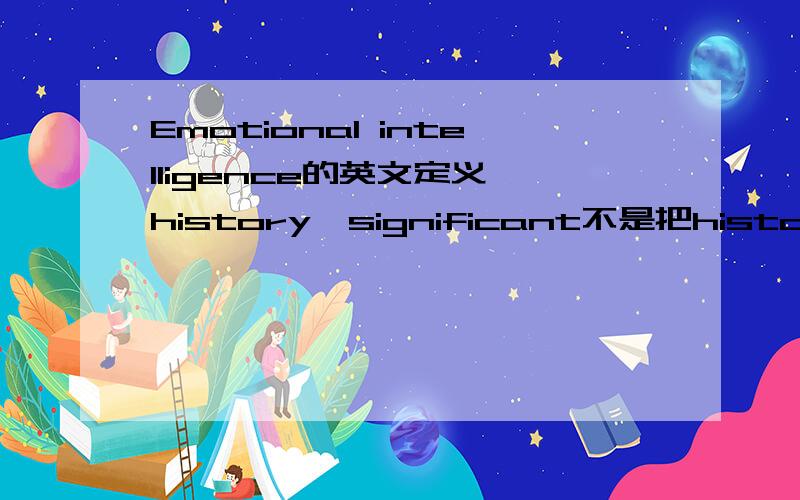Emotional intelligence的英文定义,history,significant不是把history翻译出来,
来源:学生作业帮助网 编辑:作业帮 时间:2024/11/17 18:51:53

Emotional intelligence的英文定义,history,significant不是把history翻译出来,
Emotional intelligence的英文定义,history,significant
不是把history翻译出来,
Emotional intelligence的英文定义,history,significant不是把history翻译出来,
重要性也不带这么写的啊.significance
-Emotional intelligence (EI) refers to the ability to perceive,control and evaluate emotions.
-A Brief History of Emotional Intelligence
1930s – Edward Thorndike describes the concept of "social intelligence" as the ability to get along with other people.
1940s – David Wechsler suggests that affective components of intelligence may be essential to success in life.
1950s – Humanistic psychologists such as Abraham Maslow describe how people can build emotional strength.
1975 - Howard Gardner publishes The Shattered Mind,which introduces the concept of multiple intelligences.
1985 - Wayne Payne introduces the term emotional intelligence in his doctoral dissertation entitled “A study of emotion:developing emotional intelligence; self-integration; relating to fear,pain and desire (theory,structure of reality,problem-solving,contraction/expansion,tuning in/coming out/letting go).”
1987 – In an article published in Mensa Magazine,Keith Beasley uses the term “emotional quotient.” It has been suggested that this is the first published use of the term,although Reuven Bar-On claims to have used the term in an unpublished version of his graduate thesis.
1990 – Psychologists Peter Salovey and John Mayer publish their landmark article,"Emotional Intelligence," in the journal Imagination,Cognition,and Personality.
1995 - The concept of emotional intelligence is popularized after publication of psychologist and New York Times science writer Daniel Goleman’s book Emotional Intelligence:Why It Can Matter More Than IQ.
-Significances:
1.Overall impact on success.
It has been said that your IQ can land you a job but your lack of EQ can get you fired.Your IQ only accounts for 20% of your success in life.Your emotional intelligence and social intelligence are much greater determinants of the success you will achieve in life.
2.Delayed gratification.
Delayed gratification is the top predictor of future success.People who are able to pay the price today and delay the rewards are much more likely to succeed in life.Unfortunately we have become a nation seeking instant gratification.This shows up in our everyday lives in the foods we choose to eat,the buy now pay later way of life,our inability to follow an exercise regime and putting mindless entertainment ahead of self-development.
3.Our relationships with others
Our emotional skills have a direct and important bearing on our relationships with others.We need to understand our feelings,where they come from and how to properly express them.We will not maintain healthy relationships unless we can control our emotions,communicate our feelings in a constructive manner and understand the feelings of others.
4.Impact on our health
There is a direct connection between our emotional health and our physical health.If our lives are filled with stress,our physical health suffers.It has been estimated that well over 80% of our health problems are stress related.We experience stress primarily because we are not comfortable emotionally.We need to understand the link between our emotional health and our physical health.
5.The connection between poor EQ and rising crime
Unfortunately there is a direct connection between poor emotional skills and the rising crime rate.Children who have poor emotional skills become social outcast at a very young age.They might be the class bully because of a hot temper.They have learned to react with their fist rather than reason.Poor social and emotional skills contribute to poor attention in class and feelings of frustration.They rapidly fall behind and make friends with others in the same boat.There is a direct path to crime that starts early in life.While there is no doubt that family and environment are great contributors,the common thread is poor emotional and social skills.The direct result of poor training in emotional skills.